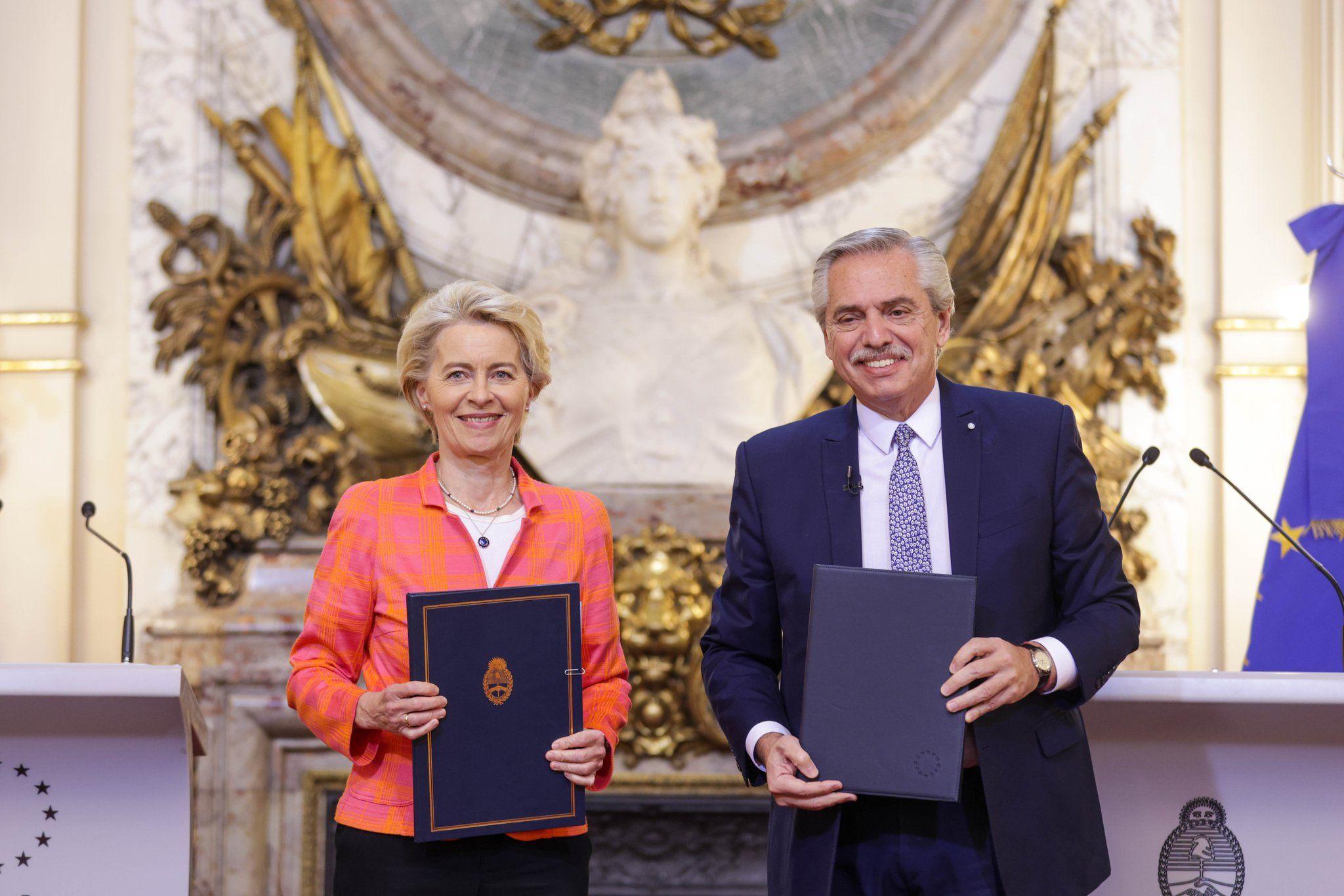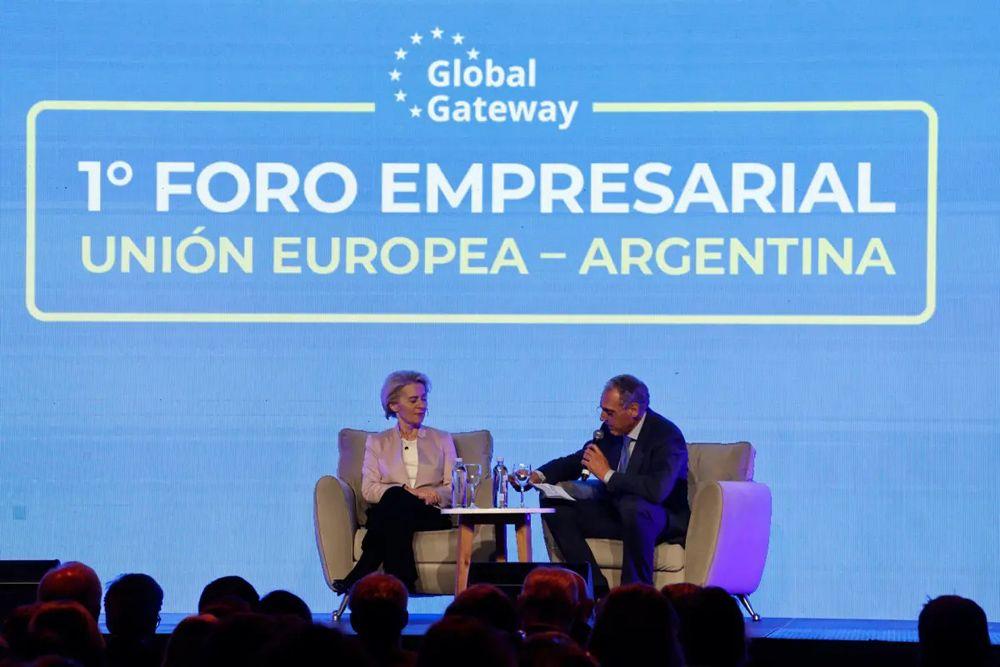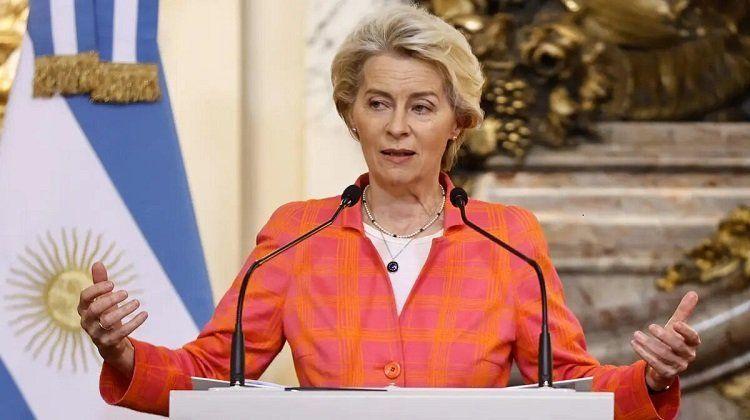On the week of 12 June, the President of the European Commission Ursula von der Leyen, took a tour of four Latin American countries, facing the EU-CELAC Summit (Community of Latin American and Caribbean States) which will take place in Brussels on 17 and 18 July.
First in Brazil, the European Mandate met with President Luiz Inácio “Lula” Da Silva and the National Confederation of Industry (CNI). The second stop was Argentina, where he met with President Alberto Fernández and participated in the EU-Argentina Business Forum. The tour also included Chile and Mexico.
EU biregional strategy and the importance of Latin America and the Caribbean in the new Global Gateway strategy
The European Union seeks to deepen the partnership with the whole region as a whole through CELAC. This became clear on June 8 when the High Representative (Josep Borrell) and the The European Commission adopted a Joint Declaration on the strategic importance of the link (European Commission, 2023). The biregional strategy is not the only way in which the EU relates to the region. Brussels actually uses a multilevel strategy to avoid the “single” approach. In addition to betting for CELAC as the valid interlocutor of the entire Latin American and Caribbean region, the EU also cooperates in parallel at bilateral level (with each country in the region, with distinct reaches and according to particular needs), and at subregional level, with commercial/political blocks such as Mercosur and SICA (Central American Integration System).
The European Commission adopted a Joint Declaration on the strategic importance of the link (European Commission, 2023). The biregional strategy is not the only way in which the EU relates to the region. Brussels actually uses a multilevel strategy to avoid the “single” approach. In addition to betting for CELAC as the valid interlocutor of the entire Latin American and Caribbean region, the EU also cooperates in parallel at bilateral level (with each country in the region, with distinct reaches and according to particular needs), and at subregional level, with commercial/political blocks such as Mercosur and SICA (Central American Integration System).
This strengthening of the EU’s strategic partnership with the region, has been given by the new Brussels strategy, Global Gateway, “to boost smart, clean and safe links in the digital, energy and transport sectors, as well as to strengthen health, education and research systems worldwide” (European Commission, 2023). In this way, the new strategy is also based on the Green Pact of the Union approved in 2020. Global Gateway aims to mobilize 30 billion euros in investments of this kind across the globe. Latin America and the Caribbean occupies a central place (10 billion euros for the subcontinent). The region increasingly gains relevance to Europe in a context of a policy of diversification of critical raw materials and alternative energy sources (lithium batteries, gas licuation plants, green hydrogen, among others), added to the weaknesses of global supply chains. For several years, the EU has been trying to broaden its spectrum of energy partners. The pandemic and Russian invasion of Ukraine acted as the ultimate catalyst of this goal.
Von der Leyen visits Argentina to boost the EU-Mercosur trade agreement and strengthen strategic partnership in renewable energies and raw materials
von der Leyen's visit, in addition to preparing the ground for the next EU-CELAC Summit and presenting the opportunities of Global Gateway for Latin America and the Caribbean, aims to end the EU-Mercosur trade agreement that was announced in August 2019. The agreement is in its phase of technical review, and on both sides, it is considered that the change of administration in Brazil together with the new geopolitical scenario are elements that open “a window of opportunity”.
 The brief step of the President of the European Commission by Argentina had some concrete announcements, in addition to the lines already working through diplomatic negotiation. A memorandum of understanding was signed for a strategic partnership on global chains of sustainable raw materials value, in line with the pillars of Global Gateway. The focus of the EU is placed on lithium and the construction of a global value chain that allows generating added value for Argentina. According to von der Leyen, lithium demand in Europe is expected to increase “twelve times to 2030” (Casa Rosada, 2023). It is necessary to remember that the EU is the main investor in Argentina (40% of the IED approximately) (Casa Rosada, 2023) and seeks to put the benefits of a “alternative investment model”, very different from what can offer other powers like China in the region. This model has as one of its pillars the production of clean energy (such as solar, wind, and green hydrogen). The Union seeks Argentina to become a “reliable regional renewable energy center” (Casa Rosada, 2023).
The brief step of the President of the European Commission by Argentina had some concrete announcements, in addition to the lines already working through diplomatic negotiation. A memorandum of understanding was signed for a strategic partnership on global chains of sustainable raw materials value, in line with the pillars of Global Gateway. The focus of the EU is placed on lithium and the construction of a global value chain that allows generating added value for Argentina. According to von der Leyen, lithium demand in Europe is expected to increase “twelve times to 2030” (Casa Rosada, 2023). It is necessary to remember that the EU is the main investor in Argentina (40% of the IED approximately) (Casa Rosada, 2023) and seeks to put the benefits of a “alternative investment model”, very different from what can offer other powers like China in the region. This model has as one of its pillars the production of clean energy (such as solar, wind, and green hydrogen). The Union seeks Argentina to become a “reliable regional renewable energy center” (Casa Rosada, 2023).The implementation of Global Gateway together with the Mercosur-EU agreement has the potential to further leverage the Union's position on commercial matters in Argentina. That is why the President of the European Commission also participated in the Business Forum between the EU and Argentina. This is the first edition, which aims to contribute to the process of economic integration, explore the potential to drive development and reflect on the common challenges (EU Delegation in Argentina, 2023). Some of the topics discussed were digitization, sustainability and energy, and know some projects in which the European Union delegation has been working in Argentina.





Comments